At the Aspen Institute Economic Opportunities Program, and for our many colleagues and partners, the ongoing and intertwined health, economic, and racial justice crises bring new urgency to our work to improve access to quality jobs, opportunities to participate in business ownership, and the freedom to pursue economic mobility. Below we share our June newsletter with highlights of recent work. As always, we welcome your feedback, thoughts, and partnership in advancing inclusive opportunity and an economy in which we all can thrive. Click here to subscribe.
News and Updates
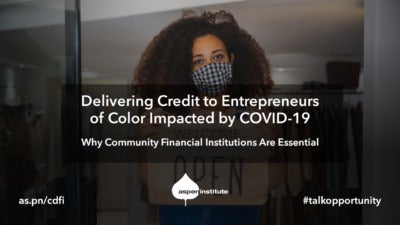
Video: Delivering Credit to Entrepreneurs of Color Impacted by COVID-19: Why Community Financial Institutions Are Essential
Small businesses have endured some of the hardest stresses of the pandemic, especially those owned by entrepreneurs of color. Funding opportunities that flow through banks often miss communities that have historically been underserved. Community Development Financial Institutions (CDFIs) serve the parts of America that too often get left behind. What role can CDFIs play in supporting entrepreneurs and advancing equity during this uncertain time? And how can policymakers, investors, philanthropy, and others support the work of CDFIs? On August 4, we hosted an event, “Delivering Credit to Entrepreneurs of Color Impacted by COVID-19: Why Community Financial Institutions Are Essential,” featuring Bill Bynum (HOPE), Michael Barr (Gerald R. Ford School of Public Policy), Nicole Jordan-Reed (Nicole Jordan Catering, LLC), and moderator Helaine Olen (Opinion Writer, The Washington Post). Click here to watch.
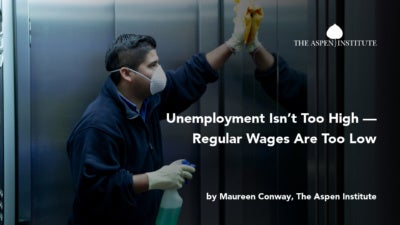
Op-Ed: Unemployment Isn’t Too High — Regular Wages Are Too Low
There has been lots of consternation in Congress and among pundits that pandemic unemployment benefits are greater than what many people were earning from work. It is time for Congress, and for us all, to recognize why that is: What many people earn from work is not enough to live on. In an op-ed for POLITICO, EOP Executive Director Maureen Conway outlines the scale of the problem and explains why lawmakers need to center job quality in their pandemic response. Congress needs to open its eyes to the pandemic of poverty wage work, stop abetting it, and start promoting the kind of work that makes a good life possible. Click here to read more.
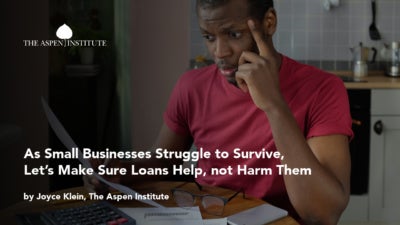
Op-Ed: As Small Businesses Struggle to Survive, Let’s Make Sure Loans Help, not Harm Them
When it comes to financial protection, the small business lending industry is still the wild west. Laws that apply to consumer loans don’t apply to business loans, and predatory lenders are free to hide interest rates, punitive fees, and coercive collection practices. In our pandemic-driven economy, this has caused a world of hurt for entrepreneurs. In an op-ed for The Hill, Business Ownership Initiative Director Joyce Klein explains why we must continue the push for truth-in-lending legislation. Building on the momentum of laws passed and proposed in California and New York, the US Congress just introduced a bill to give small business owners the safeguards they deserve. All of these pieces of legislation have been endorsed by the Responsible Business Lending Coalition, of which BOI and the Aspen Institute are founding members. As we begin to reopen and rebuild, now is the time to protect the small businesses that will drive our recovery and revitalize our communities. Click here to read more.
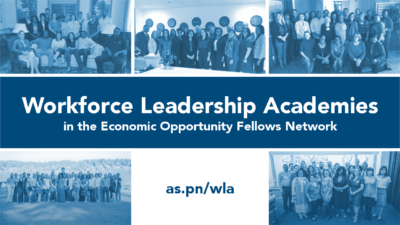
Updates from the Workforce Leadership Academies
Fellows in the Dallas Economic Opportunity Leadership Academy are zeroing in on areas for action in CoLab teams. This month they were joined by Clair Minson (Assistant Vice President, Talent Development, New Orleans Business Alliance) for a conversation on the transformative change required for centering race equity in workforce development. Together Fellows shared the importance of their role as leaders in examining their own work, setting explicit equity goals, and developing a community of accountability and support. The Dallas Academy final session with local stakeholders will take place in October.
Upcoming Events
EOP will continue to host virtual events and webinars this summer. Join our mailing list and follow us on social media to learn when new opportunities are available.
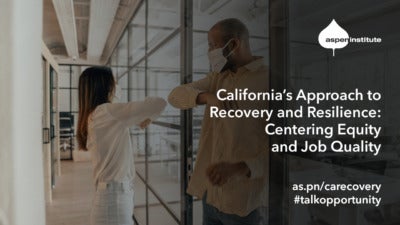
August 26: California’s Approach to Recovery and Resilience: Centering Equity and Job Quality
Questions about the future of work have shifted in this time of pandemic, prompting overdue discussions about workplace health and safety, the unemployment system, health insurance, and fair wages and benefits. What policies can support a thriving future of work? What roles do we want private business to play? And what strategies will build a future of work that addresses long standing inequities and inequalities and provides opportunities for all to thrive? California’s Future of Work Commission and Jobs and Recovery Task Force have been working on these questions since before the pandemic and have begun implementing innovative policies to address the critical challenges facing working people in today’s economy and tomorrow’s. Join us August 26 for our discussion, “California’s Approach to Recovery and Resilience: Centering Equity and Job Quality,” featuring Julie Su (Secretary, California Labor and Workforce Development Agency), Angela Glover Blackwell (Founder in Residence, PolicyLink, and member of Governor Newsom’s Task Force on Business and Job Recovery), and moderator Meghan McCarty Carino (Workplace Culture Reporter, Marketplace). Click here to register.
Upcoming: Job Quality in Practice Webinar: How the Workforce System can Advance Workplace Health and Safety During (and After) the Pandemic
Join us for our next Job Quality in Practice webinar, “How the Workforce System can Advance Workplace Health and Safety During (and After) the Pandemic.” Panelists will share about the crucial role workforce development professional can play in advancing workplace health and safety, including through direct engagement with employers and partnerships with local advocacy organizations. Panelists will also discuss how these strategies can be applied to other job quality areas and ways public and philanthropic funders can support this critical work. We will announce a date and time soon. Please join our mailing list to receive updates about the event and to RSVP.
Join the conversation
Follow EOP on social media to join the conversation!
Tweet What’s new at EOP? Learn how the @AspenInstitute Economic Opportunities Program is helping people connect to and thrive in a changing economy.
About EOP
The Economic Opportunities Program (EOP) advances strategies, policies, and ideas to help low- and moderate-income people thrive in a changing economy. We recognize that race, gender, and place intersect with and intensify the challenge of economic inequality and we address these dynamics by advancing an inclusive vision of economic justice. For over 25 years, EOP has focused on expanding individuals’ opportunities to connect to quality work, start businesses, and build economic stability that provides the freedom to pursue opportunity. For more information, visit as.pn/eop.
EOP has several initiatives, including the Business Ownership Initiative, Workforce Strategies Initiative, UpSkill America, and Good Companies/Good Jobs. In addition, across these approaches EOP hosts the Economic Opportunity Fellows Network and the Opportunity in America event series.
The Aspen Institute is a global nonprofit organization committed to realizing a free, just, and equitable society. Founded in 1949, the Institute drives change through dialogue, leadership, and action to help solve the most important challenges facing the United States and the world. Headquartered in Washington, DC, the Institute has a campus in Aspen, Colorado, and an international network of partners. For more information, visit aspeninstitute.org.
Thank you to our many partners and funders for supporting our efforts.
Support Our Work
We are committed to making our events and publications freely available to everyone who finds them useful. But if you find value in our work and are able to support it, please consider making a tax-deductible donation. Click here to learn more.
Keep in Touch
Click here to join our mailing list or sign up below. For updates every day, follow us on social media.


